Posts Tagged ‘Senegal PEN’
PEN Journey 45: Dakar, Senegal: The Word, the World and Human Values
PEN International celebrates its Centenary in 2021. I’ve been active in PEN for more than 30 years in various positions and now as an International Vice President Emeritus. With memories stirring and file drawers of documents and correspondence bulging, I am a bit of a walking archive and have been asked by PEN International to write down memories. I hope this personal PEN journey will be of interest.
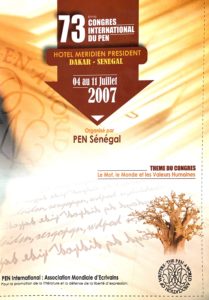
Program for PEN International’s 73rd World Congress in Dakar, Senegal, July 2007
PEN International’s 73rd World Congress in Dakar, Senegal July 2007 celebrated the first Pan African PEN Congress with over 200 writers gathered from over 70 countries around the theme “The Word, the World, and Human Values.” The theme had been developed by PEN’s African centers who assisted in the planning of the Congress which brought together writers from every continent as well as from across Africa.
The setting was grand on the rugged Atlantic coast at Le Meridien Hotel. Government luminaries, including the President of Senegal Abdoulaye Wade and Prime Minister Cheikh Hadjibou Soumaré greeted delegates at the opening and closing ceremonies in the tiered auditorium where the Assembly of Delegates conducted PEN’s business. Ministers of Culture, Information and Foreign Affairs hosted dinners in the evening as did the President and Prime Minister.
Because PEN monitored the human rights situation in countries, particularly regarding freedom of expression, PEN vetted carefully countries where it held its Congresses. Senegal had prosecuted four journalists the past year, but none were in detention, and PEN Senegal and the International Writers in Prison Committee (WiPC) were advocating to abolish defamation laws used to repress writers across the continent. Senegal in general was an open society for writers. On the few occasions when PEN hosted Congresses in countries with more repressive regimes, it took no assistance from the government and used the occasion to advocate on behalf of the writers.
The 73rd Congress marked the end of my term as PEN International Secretary. At my first Congress as International Secretary, I’d opened with the image of a bridge soaring into the sky, a bridge that had taken decades to construct. I had suggested that for the last decade International PEN had been building an organizational bridge into the 21st century. Having occupied the position of International Secretary for three years on a daily basis, I could attest that PEN was a robust, though occasionally fragile, organization whose bridges across cultures were real, whose joints were welded by the principles of the PEN Charter and by the fellowship among writers.
For me, memories abounded—memories of the ancient city of Diyarbakir, Turkey where Kurdish and Turkish writers translated each other side by side for the first time; the gathering in Hong Kong where writers from mainland China, Taiwan, Hong Kong and the diaspora, along with other writers from around the world, met and shared ideas and literature; and the memory of the dungeons of Gorée Island with its dark doorway to the Atlantic, similar to “the door of no return” on Ghana’s Cape (Gold) Coast where the most basic human rights had been violated centuries before when men and women were shipped as slaves to other countries, including to my own.
At the Congress PEN members traveled to Gorée Island off the coast of Dakar to see and to pay homage to this history and through PEN’s work to act on behalf of freedom and human dignity today.

Visit to Gorée Island, Senegal. L to R: Carles Torner (Catalan PEN), Eugene Schoulgin (Norwegian PEN), Lucian Kathmann (San Miguel PEN), Eric Lax (PEN USA West), Joanne Leedom-Ackerman (PEN International Secretary), Mamadou Tangara (Gambia.)
A Nobel Laureate in science once said, “Discovery consists in seeing what everyone else has seen and thinking what no one else has thought.” That could be said of the writer whose imagination saw bridges between people and cultures where others saw clashes and conflict.
Before each Congress I made a point of reading histories of PEN, particularly the history of the place where PEN was holding its Congress. The 73rd Congress was only the second time PEN’s whole international body had met in Africa. Forty years before a PEN delegate at the 35th Congress in Abidjan, Ivory Coast recalled ascending the stairs of the Congressional Hall between a double row of guards dressed in scarlet and gold with raised sabers. At that Congress PEN members took special notice of writers in prison in Communist and noncommunist countries. There were not many PEN centers in Africa then, but PEN Senegal existed. At the Congress the prior year in New York City in 1966, delegates from the Ivory Coast and Senegal had attended as had observers from Ghana, Kenya and Nigeria. By 2007 PEN had 15 centers in Africa, including in those countries whose writers had visited the New York Congress. Today PEN has 28 African centers.
At the Dakar Congress, writers from regions who hoped to develop PEN centers observed, including Uighur writers, Afar-speaking writers and writers from Tunisia, Bahrain, Iraq and Jordan, all of whom eventually formed PEN centers. Forty years ago International PEN also had observers from the Soviet-bloc. In all these instances, PEN had acted as a bridge to writers who aspired to share their literature and to work for freedom of expression in their societies.
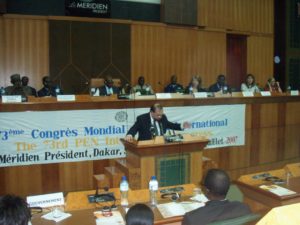
PEN International President Jiří Gruša addressing PEN Assembly of Delegates at 73rd Congress, 2007.
In Dakar, International PEN President Jiří Gruša noted, “International PEN and its Centers are glad to be gathering in Senegal, a country which holds literature in high regard, in part because its first President Leopold Senghor was the internationally renowned poet and also a Vice President of International PEN.”
Mbaye Gana Kébé, Senegal PEN President, affirmed, “Senegal has remained a welcome land at the crossroads of all civilizations. In addition to that we have its democratic ideal and respect of human rights. This Congress taking place here consecrates a lasting and beautiful tradition of African hospitality.”
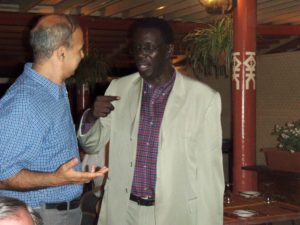
International PEN Board Member Mohamed Magani (Algerian PEN) talking with Alioune Badara Bèye (General Secretary Senegal PEN).
The Congress theme “The Word, the World, and Human Values” was explored thorough round table sessions including “Literature and the Oral Tradition” and “The Role of Contemporary African Literature in Intercultural Dialogue” and at International PEN’s first literary event “Freedoms” held outside under the stars. Hosted with TrustAfrica, a new African foundation that promoted peace, economic development and social justice, the evening and the panels featured writers from across Africa, noted Senegalese PEN Vice President Amadou Lamine Sall and General Secretary Alioune Badara Bèye who were instrumental in arranging the Congress. Writers included Bernard Dadié (Ivory Coast), Jean-Baptiste Tati Loutard (Congo), Fernando d’Almeida (Cameroon), Dieudonné Miuka Kadima Nzuji (Congo), Tanure Ojaide (South Africa), Frédéric Pacéré Titinga (Burkina Faso), Aminata Sow Fall and Pr. Abdoulaye Elimane Kane (Senegal), and Jack Mapanje (Malawi).
In the hotel’s meeting rooms, PEN’s standing committees adjourned. The Writers in Prison Committee (WiPC), chaired by Karin Clark (German PEN), focused on criminal insult and defamation laws, particularly in Africa. These laws endangered writers and resulted in imprisonments. During the previous year WiPC had followed 1100 cases worldwide of attacks on writers, ranging from killings, long term detentions, threats, and harassments. Around 320 of those had been in Africa.
PEN also brought attention to the refugee crisis in Iraq with an appeal for translators, writers and journalists who were being targeted for death because of their work. In a resolution supported by American PEN and passed unanimously, International PEN urged the US to protect these refugee writers and translators and to increase funding for UNHCR and other refugee services and remove barriers to resettling Iraqi refugee writers and intellectuals.
The Translation and Linguistic Rights Committee (TLRC), chaired by Kata Kulavkova (Macedonia PEN), considered the mounting threats to linguistic diversity in an English-dominated world. Delegate Esther Allen (PEN America) presented “To Be Translated or Not to Be: Globalization, Translation, and English,” a major survey of barriers to the exchange of literature and entrance into the international literary marketplace. The Assembly of Delegates passed a resolution calling on UN member states to comply with international conventions on linguistic rights.
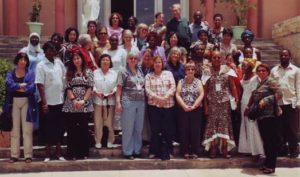
International PEN Women Writers Committee Conference, Dakar, Senegal, July 2007.
The Women Writers Committee (IPWWC), chaired by Judith Buckrich (Melbourne PEN), met during the Congress and also at its own conference right after the Congress to examine the challenges faced by women writers, especially as related to freedom of expression and censorship, particularly in Africa. The writers also discussed women’s literacy and educational opportunities and explored the publishing potential for voices which struggled to be heard.
PEN’s Peace Committee, chaired by Edvard Kovač (Slovene PEN), met with an appeal to bring writers in countries at war together in an exchange of literature and ideas such as at a recent meeting between Turkish and Kurdish members
The Writers in Exile Network, chaired by Haroon Siddiqui (PEN Canada), reported that PEN continued to assist resettling writers under threat, often at universities, and also through partnership with the International Cities of Refuge Network (ICORN).
International PEN’s Executive Director Caroline McCormick and her team worked before, during and after the Congress on regional development. “International PEN is working in partnership with its African Centers to address challenges which they have identified in the region. Essential to this work is the role of continued engagement with reading, writing and ideas in bringing about change and empowering civil society.”
Each African center had its own history and focus though many overlapped. PEN Senegal, the first and oldest center in Africa, was dedicated to raising the profile of young and new unpublished writers and published an anthology of young writers and actively promoted work through its publications and competitions. The center had the advantage of a permanent writers house which was a drop-in center and focal point for the writing community and also accommodated visiting writers.
Guinean PEN had been established by the Women Writers Association of Guinea, which made it one of few African centers that had majority of women writers as members. Headed by Zeinab Koumanthio Diallo, President of Guinea PEN, the center ran its own museum and cultural center and raised the majority of funds through income-generating activities, including performances and cultural activities with a focus on literature and on raising awareness of social issues to include communities who didn’t normally have access to the world of literature. Projects included promoting reading in rural agricultural communities and using literature to support the rights of women and girls.
PEN International’s next regional focus would be Latin America in anticipation of the 2008 Congress. After a vigorous debate at the Congress, the Assembly of Delegates voted to move the 2008 Congress from Oaxaca, Mexico because of challenges to freedom of expression there to Bogotá, Colombia, hosted by Colombian PEN which was monitoring closely, along with International PEN, the situation for writers there.
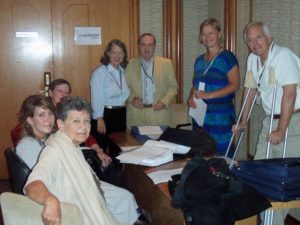
Members of PEN International Foundation Board, final meeting. L to R: Fawzia Assaad (Suisse Romand PEN), Caroline McCormick (PEN International Executive Director), Karin Clark (German PEN), Joanne Leedom-Ackerman (PEN International Secretary), Jiří Gruša (PEN International President), Britta Junge Pedersen (PEN International Treasurer), Eric Lax (PEN USA West).
The work of the 73rd Congress included the final disbanding of the International PEN Foundation which had served its purpose for over a decade as a charitable entity that existed with its own board alongside PEN International and enabled PEN International to receive charitable donations. Now that British charitable tax law had changed, PEN International, which was headquartered in London, could finally be incorporated as a charity.
The work of the Assembly of Delegates included elections of:
—International Secretary Eugene Schoulgin (PEN Norway), former WiPC Chair and International PEN Board member,
—Treasurer Eric Lax (PEN USA West), former International PEN Board member and former President of PEN USA West,
—International PEN Board members: Mike Butscher (Sierra Leone PEN), Haroon Siddiqui (PEN Canada), Takeaki Hori (Japan PEN) and Kristin T. Schnider (Swiss German PEN),
—Vice Presidents: Margaret Atwood (PEN Canada) for service to literature and Niels Barfoed (Danish PEN) for service to PEN.
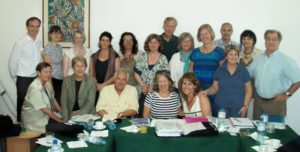
PEN International Board Meeting and Staff in Dakar, Senegal, July 2007.
Three new PEN centers were welcomed: Iraq, Jordan and Afar-speaking.
The Assembly adopted twelve resolutions from the Writers in Prison Committee focusing on the imprisonment of writers in China, Tibet, Iran, Uzbekistan, Eritrea, Cuba, Turkey, Tunisia and Vietnam, the killing of journalists in Mexico & Afghanistan and the forced closure of television stations in Venezuela.
One unexpected controversy arose just a few weeks before the Congress when the British government conferred a knighthood on Salman Rushdie. The act stirred disputes in literary and political circles which threatened to follow us to the Congress. We came prepared should questions arise. I don’t recall now if the question was asked at the closing press conference where Jiří and I sat in our new African dress which had been given to us by the Congress hosts. Along with the President of Senegal PEN we recalled the successes of the Congress and the African programs which PEN International committed to continuing.
Rather than revisit the Rushdie controversy, I quote here PEN International’s response from Vice President and Nobel Laureate Nadine Gordimer: “International PEN deplores the reaction of extremists to the honor conferred upon one of the world’s great writers, Salman Rushdie, by the Queen of the United Kingdom for his services to literature. The appalling reaction from extremists threatens not alone the principle of freedom of expression as a basic tenant of justice, but seeks to decree the violent end to the life of a writer, solely on the grounds of written words that did not call for any aggression against any group or individual.”
My personal memories of the impressive Dakar Congress include being driven around in a limousine as International Secretary. Because PEN Board Member Eric Lax was hobbling on crutches with his foot in a cast, he also hitched a ride. I would have been happy to go on the bus, but we both appreciated the gesture.
Before each PEN Congress while I was International Secretary, I studied French. I hired a tutor and talked with her for hours, practicing conversation and comprehension and jotting down what I might want to say. I understood that it was important to know the language of so many of PEN’s members, especially when the Congress was in a French-speaking country. I didn’t do the same with Spanish because my Spanish was more remedial, but I had studied French at university and so had some base. French colleagues used to say, “Your accent is cute and you are fearless,” which I think was a nice way of saying you’re not very good, but at least you’re trying.
Before I came to the Dakar Congress, I had taken out my notebook from French lessons and copied on a single page the phrases I thought I might want to say at some point. When I arrived at the opening ceremony, I was seated on the dais along with Jiří, PEN’s Vice Presidents, the President of Senegalese PEN and the President of Senegal. I had not been informed that I was expected to give a speech, but my name, along with Jiří’s, was on the program. I knew Jiří didn’t speak French, and I felt it would be insulting for neither of us to speak in one of the languages of the country. That morning I’d tucked my sheet of phrases into my bag, and as I sat there, I glanced at the accumulation of sentences; they were a kind of speech so for the first few minutes I spoke in French then said, “Now I’d like to shift to English so I can speak better from my heart.” Everyone had translation equipment.
When the closing ceremonies arrived, the same situation arose. With the Prime Minister of Senegal also on the dais, I was again listed on the program to speak. However, this time Senegalese PEN had written remarks for me in French, and I stepped over to my nearby colleagues at French PEN to practice.
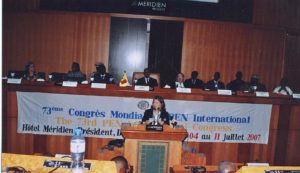
PEN International Secretary Joanne Leedom-Ackerman addressing Assembly of Delegates at 73rd PEN Congress, July 2007.
To close out this final memory, I share here a portion of my report to the Congress. Each International Secretary and President and Board member and Staff member brings his/her talents, skills and affection to this organization which is held together in part by ideals and friendship. In marking progress, no one diminishes the work that came before. I continue to note in wonder the improbability of an organization of writers connected around the globe in 150 centers in more than 100 countries surviving for a century. With gratitude I recognize those who have come before and kept the organization together and those who come after and add to the bridges and structures or whatever metaphor suits at the time. Here is a brief summary of my journey those years as International Secretary:
As an organization we have grown in the past three years, both in numbers of centers, scope of activity, and size of the Secretariat. We have worked to strengthen the infrastructure of the London office so that it can better assist the centers and can coordinate the international work of PEN. We have put financial systems in place for budgeting and have expanded fundraising, and have established employment procedures and contracts for staff and transparent criteria for our own grant-making.
The Board, which now meets monthly by phone, has worked, along with the Staff and myself, in this process. I want to take this moment to thank the Board whose members work hard on your behalf and each of whom has always said yes when asked to take on a task. I’ve also had the pleasure of working with a wonderful staff, first Jane Spender, who has now retired and sends her best and with the highly qualified team of Caroline McCormick, Sara Whyatt and now Frank Geary and Karen Efford and newer members Tamsin Mitchell and Emily Bromfield…I want to thank former International Secretaries Alexandre Blokh and Terry Carlbom who have always been available when I’ve sought counsel. And I want to thank so many of you in the centers who have helped me in the work and my home center in America for sustained support. Finally we all want to thank Senegalese PEN for its work in putting on this Congress and all the African centers who participated in this effort.
To finance PEN’s growth we have raised funds from new funders and from existing funders, who have signed onto the expanded program for International PEN and have given us larger grants…
I’ve had the pleasure of working with and visiting many of you and your centers over the last three years…One of the greatest pleasures of working with International PEN has been developing friendships around the globe.
PEN is only as strong as its centers. We have been working through our regional program on a one-to-one basis with centers in Africa this year to develop strategic plans. Through the Board we have also been in touch with centers whom we have not heard from in long time to see if they still exist and to find out how we might help them. Through the workshops at the Congresses and in the consultations last year with the whole membership, we have developed for centers a guide to good governance which we will share later at this Congress. Most PEN centers already operate according to the principles of transparent membership criteria, regular elections, rotation in office, and governance by a constitution, but other centers need assistance in this area.
PEN began as a club of writers committed to the ideals which developed over the years. But a club does not mean that qualified writers should be kept out of the work of PEN or that PEN should be an exclusive Academy. There has always been the balancing of PEN as a club and PEN as a nongovernmental organization (an NGO.) Each center chooses its activities, but internationally, PEN operates as an NGO. That is why we have consultative status at the United Nations. Clubs do not receive this status. As an international organization we work to achieve goals related to civil society—the goals of promoting literature and defending freedom of expression. The work of International PEN, through its committees and through the centers and writers who chose to participate in the international work, serves these goals.
This year Caroline and I visited UNESCO several times and are happy to report that UNESCO officials are enthusiastically recommending PEN’s partnership under the framework agreement be renewed for another six-year period. They specifically praised PEN for its “significant modernization.”
At a PEN Congress in 1966 the Mexican novelist Carles Fuentes took note of “the improbable spectacle of 500 writers—conservatives, anarchists, communists, liberals, socialists—meeting not to underline their differences or to enumerate their dogmas, but to bear witness to the existence of a community of spirit while accepting diversity of interests.” That is still what PEN is and what PEN represents to the world.
The theme of this Congress—The Word, The World and Human Values—resonates and was chosen by PEN’s African centers. I am particularly honored to be finishing my term in Africa, for African literature and the literature of African American writers have had a significant influence on my own work as a writer. I’d like to end with a verse from Senegal’s great poet and first President and also International PEN Vice President Leopold Senghor, from his elegy written after the assassination of my countryman Martin Luther King. Senghor’s life offered a kind of bridge in the world. Through his life and his words, he showed how an individual and a writer can in fact enhance human values.
From Senghor’s “Elegy for Martin Luther King”:
“As the Reverend’s heart evaporated like incense and his soul
Flew like a diaphanous rising dove, I heard behind my left ear
The slow beating of the drum. The voice and its sharp breath close to
My cheek said: ‘Take up your pen and write, Son of the Lion.’
“And I saw a vision…”
You must read the poem to see the vision, but I can tell you it is a vision very much in the spirit of PEN.
Next Installment: PEN Journey 46: Wrapping Up
PEN Journey 38: PEN’s Work On the Road in Kyrgyzstan and Ghana
PEN International celebrates its Centenary in 2021. I’ve been active in PEN for more than 30 years in various positions and now as an International Vice President Emeritus. With memories stirring and file drawers of documents and correspondence bulging, I am a bit of a walking archive and have been asked by PEN International to write down memories. I hope this personal PEN journey will be of interest.
There have been a number of conferences and a few Congresses in PEN I’ve regretted not being able to attend. One was the Women’s Committee conference June 2005 in Bishkek, Kyrgyzstan right after the 71st Bled Congress. As International Secretary, I have notes and reports from that conference. Nine years later in the fall of 2014, PEN held its 80th World Congress in Bishkek, a Congress I did attend. The Women Writers Committee led the way for International PEN into Central Asia. Later in 2005 members of the Women Writers Committee also met at the International PEN conference in Ghana which I did attend.

Bishkek, Kyrgyzstan, site of PEN International’s Women Writers Meeting in June 2005 and Accra, Ghana, site of PEN International’s African conference and also meeting of African women writers, November 2005.
First, Bishkek: The President of Bishkek PEN Vera Tokombaeva was concerned about the circumstances of writers in Central Asia since the breakup of the Soviet Union. She suggested to the new Women Writers Committee (IPWWC) chair Judith Buckrich that PEN hold a women writers meeting in Bishkek. Many of the institutions which had enabled writers to publish had vanished, and the status of women in the region had grown worse. Young writers from Kyrgyzstan, Kazakhstan, Uzbekistan and Tajikistan who were members of the PEN center were troubled by the decrease in the number of women working creatively. Only a handful were left.
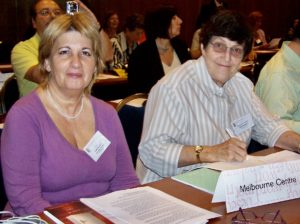
PEN Women Writers Committee Chair Dr. Judith Buckrich and International PEN Board member Judith Rodriguez (Melbourne PEN)
Bishkek PEN did a study highlighting the problem. Central Asian women writers were struggling with poverty, it said, and literature was no longer published unless self-published with limited distribution.
“Women writers are now mostly on their own. They have fallen into a cultural vacuum,” the conference proposal noted. “They are not in contact with colleagues outside their own country and know nothing of the state of culture in the world. In the meantime the global community has begun to pay attention to Central Asia because its difficult geopolitical situation could lead to the rise of violent, ultra-religious and fundamentalist ideologies into the area. And it is partly the lack of modern local literature that makes the region a breeding ground where alien ideologies can take root among young people. Flourishing modern literature could be the means to disseminate democratic ideas and social awareness.”
International PEN raised funds for the conference whose theme was “Women and Censorship.” Women from Kyrgyzstan, Kazakhstan, Turkmenistan and Uzbekistan as well as from Finland, Norway, Switzerland and Australia gathered. The discussion focused on the access to education for women, access to literature and the formation of support groups and publishing cooperatives within and outside the region and ways to overcome censorship and self-censorship. The group addressed external pressures on what women should write and considered ways and means to access funding for women writers.
Attendee Kristin Schnider, President of Swiss German PEN, noted, “Following the discussion on the main topic, women and censorship in Central Asia, I learned just how hard it is for the strong and determined women I met to overcome censorship and self-censorship within their societies…First and foremost a woman is perceived as a mother and wife, tending the family. So much so that women feel they are confronted with the choice between being either creative or getting married. Women are not supposed to enter politics…[and] if women insist on writing they are supposed to stick to detective stories or romantic topics.”
In a discussion “The Situation in Central Asia: Women and Society and Economic Censorship,” moderator and documentary film maker Dalmira Tilepbergenova from Kyrgyzstan, noted: (translated from Russian)
“Patriarchy foundations have always been strong in Asia…My disclosing of gender inequality by the example of cinematograph is not casual. Because firstly cinematograph is a corporative sort of creative work and thus the problem of relations between men and women shows very clear and strikingly there. Second, I as a film director have to constantly deal with the problem of my work. Since Kyrgyzstan became independent, our cinematograph has passed through the period of its clinical death to its reestablishment. New names have already appeared and new films have been shot. But strange relations between our cinematograph and gender policy have existed up to now. Unwillingness of men to see women in the spheres usurped by men occur…instinctively. And this instinct is as strong as the instinct of self-preservation. Firstly, when the woman is engaged on an assisting job position in our cinematograph, everything seems to be all right. But as soon as the woman shows a desire to make films independently, the friendly atmosphere of men around her turns into syndicate of plotters. Men at once start to blame the woman for her excessive ambitions, incompetence, and uselessness. Men also criticize her private life. The woman’s desire to make films is considered as diagnosis of having deficit of sex.”
IPWWC Chair Judy Buckrich of Melbourne PEN reported the Bishkek conference was “a fantastic opportunity,” and said the committee had already begun planning for a meeting of women writers on the African continent to follow the Senegal PEN Congress in 2007. “The meetings are important in expanding the horizons of PEN to women who are not members of PEN but who PEN supports as part of its belief to support writers in difficult circumstances,” she noted.

Women Writers meeting at 2005 PEN Ghana conference including Veronica Uzoigwe (Nigerian PEN), Zeinab Koumanthio Diallo (Guinean Center), Ekbal Baraka (Egyptian PEN), Muthoni Likimani (Kenyan PEN), Kristin Schnider (Swiss German PEN), Caroline McCormick Whitiker (PEN International Executive Director), Jane Spender (PEN International Programs Director), Joanne Leedom-Ackerman (PEN International Secretary/American PEN)
In December 2005 International PEN’s conference in Accra brought together 36 writers, a number of them women, from 13 of PEN’s 17 African Centers to prepare for the 2007 Senegal Congress. Supported by UNESCO and hosted by Ghanaian PEN, the conference aim was to begin developing a plan for sustained programs and collaboration among the African centers and to select a theme for the Congress. While PEN Senegal would act as the host center, the World Congress was a joint effort of PEN’s PAN African Network. African members of the Women’s Committee held an additional meeting to address the challenges facing women writers in Africa and to plan for the larger IPWWC conference in 2007.
In preparing for the Ghana conference, I returned to the shelves of African literature I’d read years before and pulled some of the books which first took me to Africa before I ever arrived on the continent—Ama Ata Aidoo’s No Sweetness Here, Ayi Kwei Armah’s Fragments, Charles Mungoshi’s Waiting for the Rain. In my address to the conference, I included a quote from Ghanaian writer Kofi Anyidoho’s prose poem Akofar only to discover when I arrived that Kofi Anyidoho was on the program.
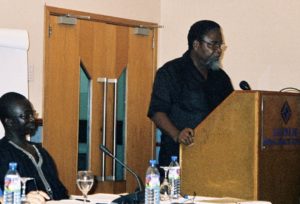
Speaking Ghanaian Professor and poet Kofi Anyidoho, seated Frankie Asare-Donkoh, Secretary PEN Ghana
From Akofar:
Words are birds. They fly so fast too far from the hunter’s aim. Words are winds. Sometimes they breeze gentle upon the smiles our hearts may wear for joy; they fan the sweat away from fever’s brow; they lull our minds to sleep upon the soft breast of earth. Yet soon too soon words become the mad dreams of storms. They howl through caves through joys into shrines of thunderbolts. They leave a ghost on guard at memory’s door. Therefore gently…gent-ly…Akofa, gen-t-ly…Take care what images of life your tongue may carve for show at the carnival of weary souls.”
The poem spoke to the themes and mission of PEN and the gathering of writers who understood that words transport over time and place and history, that words cross borders and have the power to connect us to each other and to ourselves. It is words, shaped into images and ideas, that survive wars and famine and political unrest if we are vigilant and protect them and circulate them and translate them.
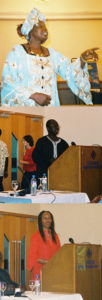
Top to Bottom: Zeinab Koumanthio Diallo (Guinean PEN), Frankie Asare-Donkoh (Ghanaian PEN), Veronica Uzoigwe (Nigerian PEN)
I also quoted from Ghanaian poet Ayi Kwei Armah’s Fragments:
“Where are you going,
go softly.
Nananom,
you who have gone before,
see that this body does not lead him
into snares made for the death of spirits.
You who are going now,
do not let your mind become persuaded
that you walk alone.
There are no humans born alone.
You are a piece of us,
of those gone before
and who will come again.
A piece of us, go
and come a piece of us.
You will not be coming,
when you come,
the way you went away.
You will come stronger,
to make us stronger,
wiser,
to guide us with your wisdom.
Gain much from this going.
Gain the wisdom
to turn your back on the wisdom
of Ananse.
Do not be persuaded you will fill your stomach faster
if you do not have others’ to fill.
There are no humans who walk this earth alone.”
The poem reflected the aspiration of PEN and the meeting among participants who, as writers, often did work alone, yet understood we were all part of a larger community. For any community of letters to thrive and survive, the freedom of the individual writer had to be protected.
At that time in Africa over 230 writers in 34 countries were listed as PEN cases, excluding Egypt, which was counted in the Middle East, though the President of Egyptian PEN also attended the meeting. The large majority of cases were journalists arrested as critics of the authorities or as whistleblowers on corruption. Journalists also ran afoul of the “insult laws” which were on the books in 45 of the 53 African countries. Because of the difficult state of publishing in Africa, journalists were the group of writers with realistic possibilities of being published. Countries of most concern then were the Democratic Republic of Congo, Eritrea, Ethiopia, Gambia, Libya, Somalia, Tunisia and Zimbabwe, none of which had active PEN centers, though a Somali-speaking PEN center did exist in London, and Zimbabwe PEN had existed but was inactive with its President poet Chenjerai Hove having to live in exile. (Today there are PEN centers in Eritrea, Ethiopia, Gambia, and Tunisia though the situation in some of the countries remains problematic.)
The Network of African Freedom of Expression Organizations (NAFEO) had formed just two months before the conference with 33 freedom of expression organizations attending a press freedom conference in Ghana. The aims of the network were similar to PEN’s whose Writers in Prison Committee would interact and assist when the network began to function.
The attendees at the Ghana conference shared experiences of their PEN centers, particularly in providing writing and reading programs in schools. Ghana PEN had a robust program in the schools as did other centers. The delegates agreed that the goals and work of PEN in Africa should include expanding freedom of expression, helping to lower barriers to publishing and disseminating African literature, cultivating new voices and increasing access to literary creation. The means to achieve these goals were part of the discussion, including cultivating new voices by working with youth writing clubs, bolstering recognition and excellence in literature by awarding literary prizes. Delegates planned for these discussions to continue among the African PEN Centers, facilitated when possible by International PEN. They also planned to expand the ideas and work at the 2007 PEN Congress.
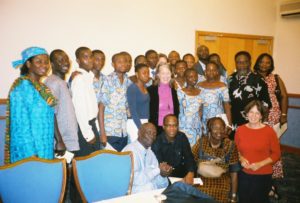
Writers and visiting students at 2005 PEN International Conference in Accra, Ghana. African PEN Centers attending conference: African Writers Abroad, Algeria, Egypt, Ghana, Guinea, Kenya, Malawi, Nigeria, Senegal, Sierra Leone, Somali-Speaking, South Africa, Uganda and Zambia as well as American and Swiss German and International PEN facilitating and note taking.
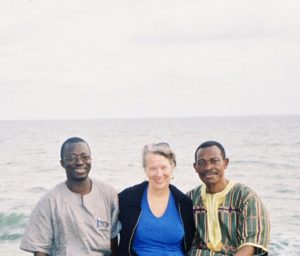
Ghana PEN organizers Frankie Asare-Donkoh, General Secretary and Frank Mackay Anim-Appiah, President with PEN International Secretary Joanne Leedom-Ackerman
During the Ghana conference the possible theme for the 2007 Congress was debated and discussed, including:
—Literature and the Environment/ Literature and Ecology
—Literature and Emancipation (women, political, financial)
—Freedom of Expression and Conflict Prevention
—African Writing in a New Age, In and Out of Africa
—The Role of Literature in the Creation of Peace (with sub-themes “The crisis of reading and readership” and “Literature for children”)
—Writers Role in Peace Building in Africa and World & Literature
—Literature and the Oral Tradition (with the subtheme of the environment)
—The Writer’s /Literature’s Role in Peace-building in Africa and the World
—Literature of Exiles/ Exile Literature
—The Roles of Literature and Publishing
—The Word, the World and Human Values
—Challenge of African Literature Today
—Being a Writer in Africa
—Writer in Age of Globalization (cultural diversity)
—Survival of Literature in New Millennium
—African Writing in New Age: In and out of Africa
—Writers and Prevention of Conflict
—Writers in Their Role in Encouraging and Promoting Literacy in Africa (Responsibility and Role of Writer)
—Literature and Conflict management in Africa and the World
—Freedom of Expression and Global Diversity
—Writers in a World in Crisis (diversity, literacy etc)
The theme finally agreed for the 73rd PEN World Congress in Dakar was: The Word, The World, and Human Values.
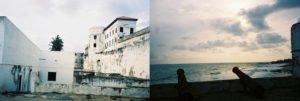
Elmina Castle, built in 1482 as Portuguese trading settlement, became principle holding prison for slave trade on Cape Coast, Ghana for three centuries.
The highlight of the conference was a long road trip to Cape Coast (also known as the Gold Coast), where the first European (Portuguese) explorers arrived in the 1400s. The Portuguese built the Castle of Elmina there which still stands on the rocks above the sea. In this new/old land the Portuguese discovered gold and also began acquiring human beings to trade for European goods. British, Dutch, Danish, Prussian, and Swedish traders soon followed and built other forts along the coast. Elmina Castle was turned into a prison for men and women who were sent shackled through “the door of no return” into slavery. From this point, as well as from Gorée Island off the coast of Dakar, Senegal, the slave trade flourished for centuries as European and other traders sold men and women and goods into the Caribbean and North and South America.
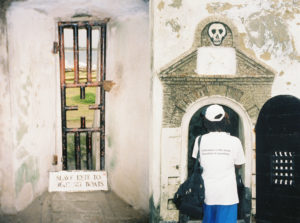
“Slave Exit to Waiting Boats” in Elmina Castle, Cape Coast, Ghana; Kadija George, President of African Writers Abroad Center standing in front of a “door of no return.” The back of her shirt reads: “Literature is the most beautiful of countries.”
The ghostly white fort of Elmina with its iron-barred cells with peep holes to the ocean facing west and the crashing surf on the rocks silenced us as we moved through these portals of history. The several hour ride back to the city was much quieter than our impatient journey to the Coast.
In Tanzania an exchange between poet and audience in the oral and performed poetry often begins:
“I give you a story.”
Audience: “I give you another.”
“I came and I saw.”
Audience: “See so that we may see.”
This power to see and invoke, to enter the rhythm of the human heart and dance there for a time with another as partner is what literature does and what PEN celebrates and tries to protect.
Next Installment: PEN Journey 39: Spiritus Loci—Literature as Home